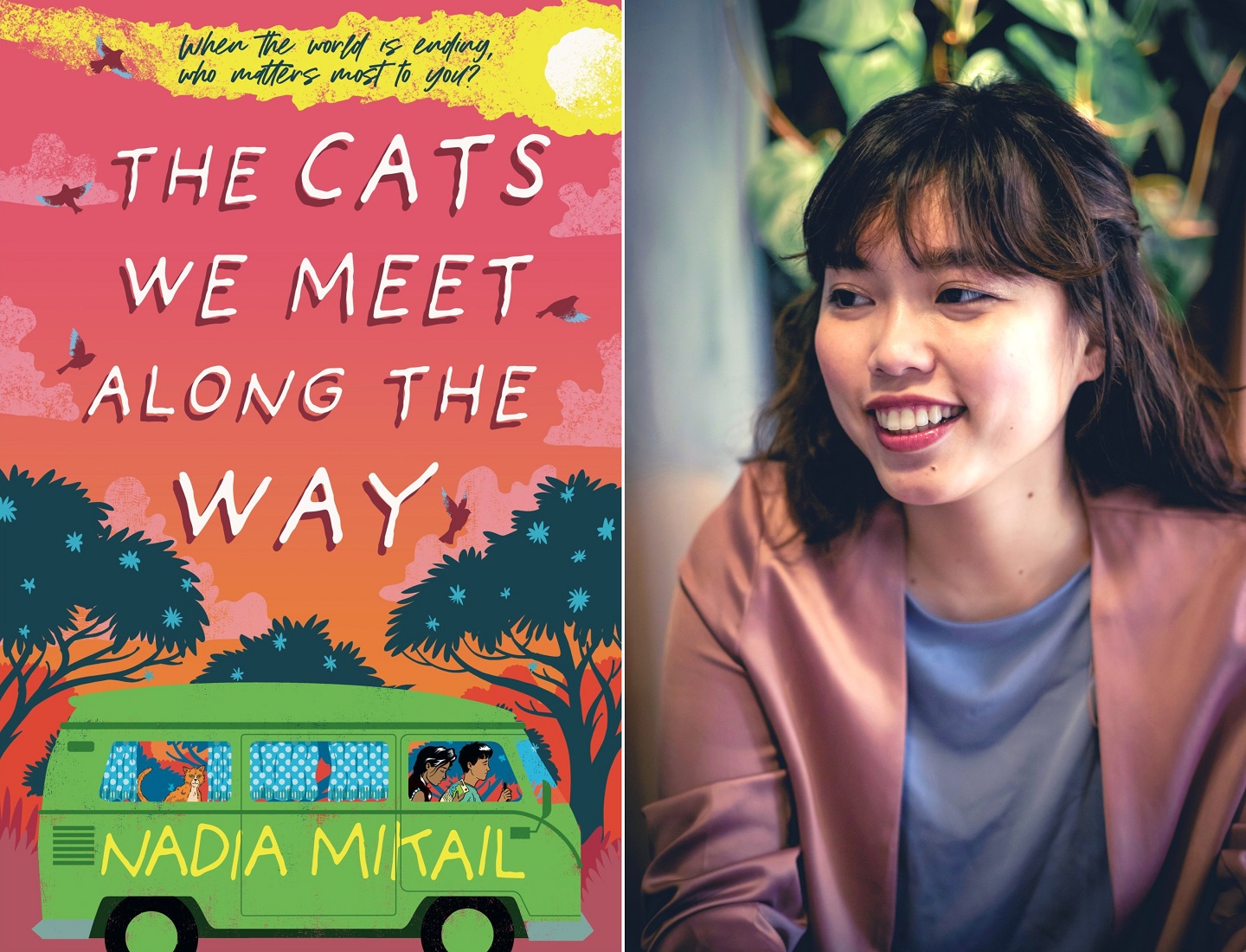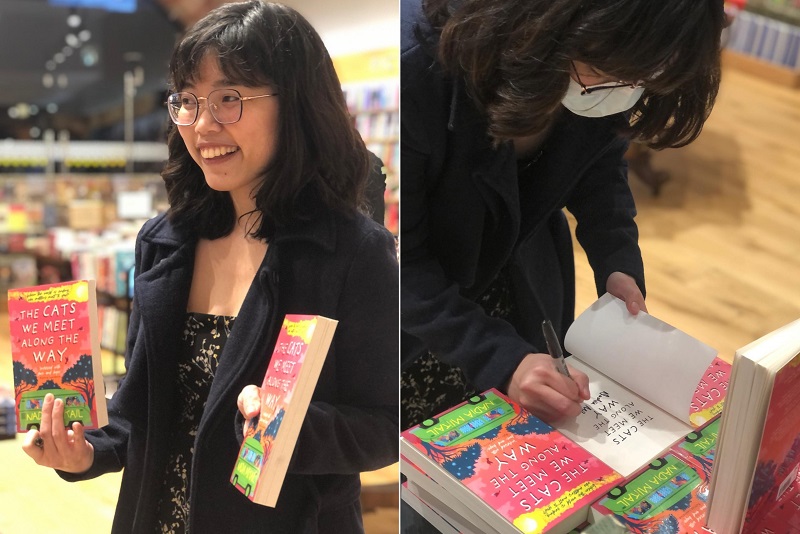
A big part of her character, from the way she talks to how she approaches the world, is shaped by various books and other people’s stories, Nadia admits (Photo: Guppy Books; Nadia Mikail)
Locked down in London two years back and missing her family, Nadia Mikail thought how easy it would be to jump into a caravan and head home to Kuching. She also wondered what it would be like if she had not seen her loved ones for a few years.
Nadia’s imaginary caravan morphs into a nifty campervan that literally drives her debut young adult novel, The Cats We Meet Along the Way, with the conflicting emotions of a family journeying to find a lost daughter the fuel. What ramps up their road trip across Malaysia is news that an asteroid will collide with Earth in nine months.
The Cats We Meet Along the Way won the 2020 YA competition held by newly created Guppy Books. The independent children’s publisher received more than 400 entries to its call for submissions from unpublished and un-agented writers. “Nadia’s astonishing, heart-warming debut about the importance of family at a time of catastrophe shone through like a jewel,” says Guppy founder and publisher Bella Pearson. When launching the competition in May 2020 — the winner gets a contract with the company — Pearson said she was not looking for perfection but “an understanding and way of telling that is truly representative of the teenage experience and the breadth of our life today”.
Nadia, 25, puts it quite simply: “They said they enjoyed my entry. I hope that’s the reason they chose it. Bella suggested some edits to make the book flow smoother and strengthen its emotional core. Those really helped.”
In her story, Aisha is the typical teenager caught up with school, her boyfriend Walter and frequent conflicting moods. Two years ago, her older sister June had upped and left home, leaving no trace of her whereabouts. When Earth’s impending doom is announced, their mother Esah, brittle and cold after their father succumbed to a painful disease, decides to search for June. Aisha joins her, together with Walter, his parents and Fleabag the cat.
Nadia, who lives with her cat called Stitch, explains that the catchy book title is a play on the phrase, the most important part of a journey is the friends we made along the way.
“I played on that because Fleabag is a kind of metaphor for Aisha to project her emotions, and how you worry about the people you love. The feelings I was trying to portray are based on my own, but not the situations.”
nadia_mikail_the_cats_we_meet_along_the_way_-_guppy_books.jpg

Whenever she is consumed by guilt and sadness, Esah shuts out everything around her and crawls into a shell, leaving Aisha feeling rebuffed, hurt and angry.
“Guess I was projecting it personally because sometimes when I’m feeling a lot, it is very easy to not want to do anything. To just sit and not be involved with anything to do with your life because the emotions you’re experiencing are too much. Some people deal with grief and pain that way.” If they have to take care of offspring, the repercussions can be hard on the children, she adds.
Aisha talks about jagged anger and an ache that threatens to coalesce into a storm. Nadia elaborates: “I think everybody feels a lot of angst at 17, especially when everything is magnified. When I submitted my first couple of chapters to Guppy, all I knew was the main character was feeling a lot of grief over the things going on in her life. I wanted to explore the idea of something very bad happening to a teenager whose emotions are already kind of big.”
Character-driven stories focused on dialogue and emotions interest her more than plot. In conversations, her characters sometimes repeat themselves — a conscious attempt by the third-year law student at King’s College London to emphasise a point. “When someone is upset about something, especially, the thought of it sticks in their head. I was trying to convey that.”
Places and houses intrigue Nadia too, and she leads Aisha and company from Kuching to Penang, Ipoh, Kuala Lumpur and Melaka, stopping at previous homes that bring back all kinds of memories.
She lets on that she loves being invited to people’s houses — “It’s a very intimate thing, I guess” — and what she notices, because the visits usually coincide with celebrations, is the food they have on the table.”
The older of two daughters of now-retired English lecturers at UiTM Sarawak, Nadia grew up feeding on books. Her parents bought her many and she would stay in their office when not in school and read what they were teaching.
“One of my earliest book memories was reading Animal Farm in my dad’s office. It’s a very visceral memory because Orwell writes in very clear sentences, in contrast to other classics I was reading at the time.”
This clear approach could well be what she is aiming for as her crisp chapters and clear sentences take readers back and forth over years and different scenarios . “I did not consciously adopt this style for the book. It was just how I was writing at the time.”
She enjoys independent writing posted online by unpublished writers and stories, for their brevity. Lately, she has been reading US poet Mary Oliver, known for poignant poems firmly rooted in place. “They are short but make me feel a lot.”
A big part of her character, from the way she talks to how she approaches the world, is shaped by various books and other people’s stories, Nadia admits. JRR Tolkien and Louisa May Alcott have influenced her the most, and of the latter’s Little Women, Amy is her favourite.
“Jo is always everyone’s favourite; she was mine for some time but I read the book and watched the movie recently and felt that Amy was always misunderstood. I’m not sure if I related to her that much but I respect that she is very honest about what she needs to do — marry well. It was something that had to be done by one of the four sisters because they were in quite unfortunate circumstances. Amy was very practical about having to support them in some way. It’s a complex viewpoint.”
The complexity of letting hurt hearts heal is handled adroitly by Nadia, who uses another metaphor to address the issue. When new skin that forms over a wound itches, people tend to scratch and it breaks open. “It’s like when something bothers a person, she keeps returning to her memory of what happened. That’s not going to help the healing process. You have to keep going and move on.”
There is a casual mention of Aisha going for therapy, which Nadia readily broaches. “I was trying to explore the idea that it’s okay to do that. Even though she’s experiencing a lot of things that obviously need to be worked through, I didn’t want to make her going for therapy a big thing, like it’s the crux of the story. It should be normalised, like keeping up with your mental health.”
Before her debut effort, this fledgling writer had a story published in KL Noir: Magic titled Pontianak, Risen — a character exploration seeded by the ghost stories her grandmother used to tell. Her short story, Facts about Stars, featured at the George Town Literary Festival 2020, and she has had pieces published in online magazines and journals.
Nadia is mulling pursuing law, a different kind of interest because it is complex and fascinating. Family law, especially, has a lot of different stories about the tragedies in people’s private lives that become public in court. British Legal History, a module she is taking this year, highlights the Bloody Code, which meted out the death penalty for crimes that seem trivial today.
The idea of a world “wreathed in fire and smoke” in The Cats We Meet Along the Way, released this February, is less to scare than prompt the thought: What if something were to happen that would force people to reconnect with their loved ones?
Recently, Nadia caught Adam McKay’s Don’t Look Up and was taken that some people had the same idea about Earth being destroyed. The 2021 movie follows two astronomers trying to warn the authorities about an approaching comet that would wipe out civilisation.
“It was really strange seeing [the premise] portrayed in another way. My book is about personal relationships, but I enjoyed it.”
This article first appeared on May 2, 2022 in The Edge Malaysia.


